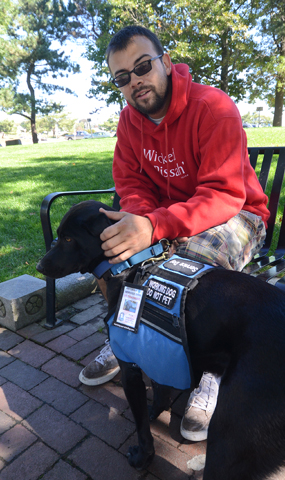
NEWBURY, MA – Newbury resident and wounded Iraqi war vet, Donald Jarvis, says he is tired of waiting for the VA or anyone else in the government to do something about veterans dying while waiting for health care.
“We served our country, we did what was asked of us, and in return we were promised that we would be taken care of if we got sick or hurt, either in battle or when we came home” Jarvis told The Valley Patriot in an exclusive interview.
Jarvis met with local legislators last month at the state house to try and get them on board with his idea of using driver’s licenses as veteran health care cards for emergency treatment. “I met with Senator Ives, Rep. DiZoglio, Kelcourse, Garry and a bunch of other legislators to talk about my new bill and they were very receptive.”
Jarvis asked Valley Patriot publisher Tom Duggan to write his new bill in cooperation with local veterans to ensure veterans can get 24-7 emergency care without waiting for the VA to open and wait forever for medical service.
“Tom just finished getting the public records law passed and that’s something nobody thought would ever happen, so he was the first person I thought of when looking for someone to help write the language of the Veteran’s Emergency Care Bill.”
Jarvis says that his idea is to turn Massachusetts driver’s licenses or identification cards into medical ID cards that vets can use at any hospital, clinic or health care facility. “The way it will work is, veterans will present their driver’s license that says ‘veteran’ when they break their leg, or have a heart attack, or have to visit a local hospital for emergency care.”
“The hospitals will work with local veteran services officers and pass the bill on to them. In turn they will work with the state to get the hospitals paid.”
Jarvis said that all veterans deserve emergency care at civilian emergency rooms and shouldn’t be treated as second-class citizens when they get sick.
“This is the best and easiest way to get it taken care of. It takes all responsibility away from the veterans. They don’t’ have to be chased by the hospitals and bill collectors, and the veterans won’t have to go through the maze of red tape and delays at the VA. It’s shameful that veterans have to chase people to get their medical bills paid before it destroys their credit. You wouldn’t believe how many vets have had their credit ruined because of medical bills that were never paid, or paid to the wrong provider, or just paid too late.”
Jarvis says that every legislator he has met with agreed that the emergency health care for veterans is a crisis and has to be dealt with quickly. “I think they get it. They seemed to know it’s a major crisis, but I don’t think before we met, that they understood the intensity of problem. “
Jarvis sys that once the language is worked out and the legislature gets on board, this program could be a model for the country. “If this works, and I know will work, it would be a great model for the rest of the country. It’s so sad that so many veterans call the suicide hotline and wait on hold for hours, or worse, get a recording to call back on Monday. It’s even sadder if the veteran has a serious health problem and they have to wait and wait to see a doctor. It cripples their daily lives. It burdens their families and their employers. This is an easy way to fix a major part of the problem.”
Jarvis says that it’s going to take a lot of hard work to get this from an idea to a workable bill in the legislature, but added that he is willing to stick it out long term. “There’s a lot that needs to be done besides writing and submitting the bill. We have to define, for example, under this bill what is and is not considered a medical emergency, a veteran, what are options for psychological care, and things like that. But, I know that working with the different veterans groups, local legislators, and using outlets like The Valley Patriot to get the word out, we can do something substantial for the men and women who served this country.”
Donald Jarvis enlisted with the National Guard served tours in Iraq and Afghanistan. In 2012, while operating a ‘buffalo’ (a minesweeping vehicle), the vehicle struck and IED and he blew up. Jarvis was severely injured with, among other things, dramatic brain injuries, as well as severe injuries to his knees and his legs.
When Jarvis came home for medical treatment, he spent seven months in a medical hospital in Virginia. When he was released, he said he needed to go back, and he needed to continue to serve, so he did.
Jarvis now works to help other wounded veterans in any capacity he can, including raising funds for local veteran groups like Delta Dog and being assigned as an explosive ordnance engineer to the Boston Marathon the day of the fatal explosion.
Jarvis was given The Valley Patriot’s Hero Veteran Award in 2016 for his work with veterans here at home.
“If I can use my experiences to help other men and women who served, if I can make a contribution that is meaningful, then something good can come from what I went through and still go through as a result of my injuries in the Middle East.”
